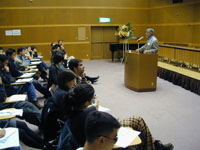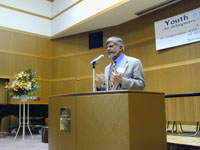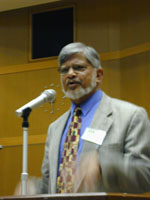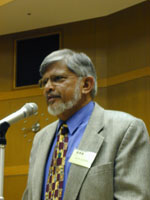[The following is the transcription of Arun Gandhi's Dialogue Questions. It remains unedited at present, but will be updated shortly]
James Harvalik:
I felt that was a very great thing that you said about taking every little
thing as a gift is very important. No matter what it is - a pencil or
whatever. I've often experienced that I receive something from someone, and
then later on I don't really need it anymore, because you often receive
such a trivial little thing, that I want to throw it away, but at the same
time I can't throw it because I feel I would be doing sort of an injustice
to this person. And I think that in the wider sense of it all, that's what
it is - our whole bodies and the bodies of our surroundings is all a gift
and ultimately I that this is a reality that we must strive for.
Arun Gandhi:
Everything is a gift. Everything, whether it is a little thing, we should
value it and use it properly and never destroy anything.
Seiko Nishida:
I strongly agree with the awareness of love because it's a very important
thing to live in here.
I think that I feel love of my, family, parents, friends and my teachers -
everything. So it's very important to know that people have love. But, on
the other hand, there are many people who aren't aware of love. What can we
do for those people?
Arun Gandhi:
I think what we can do for people who aren't aware of love is show them
love. If we show them love, they will become aware of it. Because it is a
tendency among people to be loved; I mean nobody wants to be hated, nobody
likes to be looked down upon or oppressed, so if we show them our love and
try to share with them, they will understand and respond with love. But
definitely we have a tendency if someone is down there, and we want to
trample them a little more, and push them further down. That's not really
an answer, because as I said earlier in my talk "an eye for an eye only
makes the whole world blind." Justice should not mean revenge. Justice must
mean reformation. And we must try to help each other reform each other and
then help them.
Chris Summerville:
Yes, I too would like to thank you for your comment about the pencil. And I
would like to say thany you to Satish who yesterday also made the same
point, but said it is not wrong to take from nature, but when you take from
nature you should use it as well as you can. When we organised this
conference, many of you have seen we have a coffee table out here, and one
of the temptations was to have a coffee table from Mr Donut's, or one of
the big coffee suppliers, however we decided to instead ask a small,
organic, moriyaku, independent, fair trade shop to provide the tea and
coffee for us. However, because they are small, they couldn't have nice
cups, so we had to compromise, and have paper cups. Now, when we see a
paper cup, we think of it as disposable. I want to say that, since Friday,
my paper cup, looking a bit battered, has been used nine times, and is
still strong. Of course the hope would be that the tenth time I get a free
cup of coffee, and that is why people usually recycle and take things back
- because somebody's going to give them some money. My two points are the
fact that we need to not buy into the fact that because we're been told
that this is disposable, we dispose it. My second point is that I hope that
we can encourage each other to do these things without any financial
reward. Thank you.
Charles Robinson:
You said earlier that to change other people we have to change within
ourselves. Once we have changed within ourselves, how do we go about
changing, or helping to change other people, without being violent or
trying to impose our own views.? And where do we start to change others?
Arun Gandhi:
Well you have to start by changing your habits. Like he just said if it's a
habit that we waste things and throw things away, then we stop doing that.
If it's our habit to be angry and be aggressive towards people we must stop
doing that. So we have to do some introspection, and see what kind of
violence we practice every day, and what can we change. That's where it
begins, and once you live what you want other people you learn, then they
will automatically learn. You won't have to teach them - just the fact they
see you doing things and they will be motivated to do the same thing. And
it goes from there - you don't have to go out and teach them - it happens
automatically.
Lee Sao Yong:
My question is about verbal violence because what I experience more often
around me is not real physical violence, but violence contained in
language, and I also don't want to be a violent person. So do you think
that kind of verbal violence can be considered a kind of violence? And
what is your definition of it?
Arun Gandhi:
Yes, certainly. I consider that there are so many types of violence that we
practice. Yesterday in my workshop I talked about physical violence and
passive violence. Physical violence is something that we see and experience
and it hurts us, because it's always the violence where we use physical
force against people. But there is also a lot of passive violence, which is
not physical violence that we practice all the time, in various forms -
hate, prejudice, verbal violence, operation, suppression, economic,
political, socio, cultural. You know thousands of the things that we do to
one another, sometimes even little things like we keep nudging somebody who
is sitting next to us and irritating them - all kinds of things. All that
is violence. And it is that kind of passive violence that generates anger
in the victim, and that anger then explodes into physical violence. So it's
actually passive violence that fuels the fire of physical violence, so
logically if we want to put out the fire of physical violence we have to
cut off the fuel supply, which comes from us. So each one us, again it
comes back to each one of us, bringing about change in our attitudes and
thinking.
Ari Santoso:
I read your article on violence in the 21st century and you mentioned that
violence is unnatural, and learned behaviour. But on the other hand, I
think that it's nature. To take an example - I, as a human being, will be a
success. I cannot I have a dream for fulfillment, but I have a dream for
success. Anyway I want to compete with others - this increases my
selfishness. My selfishness leads to violence, because I have passive
violence inside me. So I think violence is not unnatural, but natural. So
my question is why you think violence is unnatural, because violence is
natural. I don't need martial arts or any kind of means to kill someone. I
can use my hands; I can use my mind. That's my point, and maybe if (omission)
Arun Gandhi:
I think you have a very good point, but I would like to say that what we do
generally is mix up anger and violence, and we don't define the two
properly. When we generally don't get what we want in life, we become very
angry, and because we are not taught how to deal with this anger in a
positive manner, we abuse anger and that's where violence steps in. And so
we become violent. Akiko Goto:
If someone says something with love, what is the (omission)heart In this
case, is it an act of love? In which word, give some heart to others. What
do you think about that?
Arun Gandhi:
Now we should. I mean somebody or other is going to be hurt in an act of
love, but we should try to reduce that hurt as much as possible. It all
depends again on how we love each other. If it's the selfish love, and we
are looking only at our own love for each other, then that is not right,
but our love should be unconditional and unselfish. Then it's difficult to
hurt somebody if we are open.
Adam Wolpert:
Thank you. Part of our life is involved in pleasure, and play, and
enjoyment of sexual experiences. And in today's world that's been made into
a big market, a big business and commodity. What would Gandhiji talk
about. What would a good and non-violent way for us to enjoy recreation and
pleasure and play?
Arun Gandhi:
[applause]


 We become violent in the physical sense to a limited
extent. It's really difficult - you may say that you can kill somebody with
your bare hands, but it's very difficult to do that. I mean I can't imagine
anyone standing up here and killing anybody with their bare hands - pulling
out there hair, or killing them - it's difficult to do. It may seem very
easy, but it's not easy. So I say that it is still not a natural behavior
of human beings - it is something that have to learn to do. The very fact
that we have all these martial arts institutes who are doing very good
business indicates that there is a need for this kind of thing. So there is
that kind of need, and we can also unlearn that, and learn positive ways of
dealing with our anger, so that we don't have to use it, but we channel
that anger into positive action. Unfortunately, over the centuries, human
beings are so motivated by the negative things. Like Satish said yesterday,
we are so obsessed with success - and we measure success with the economic
yardstick - "how much do I possess, what do I possess and how much money do
I make?" That is the yardstick of success. Which makes us very selfish and
self-centered and negative in our thinking - we are always thinking about
ourselves and not about other people. And that leads to a whole cycle of
negativity throughout life. But that is not something we have to live with.
If we are progressing towards civilisation, if we are becoming a civilised
society, which I hope we have not neglected to do, then we should get rid
of all this negativism from our behavior, and replace it with positive
things, so that we truly become civilised and learn to live with each other
as human beings, and respect each other as human beings, and not look upon
each other with the labels that we have put upon ourselves. We have far too
many labels on ourselves. We are looking at people as coming from this
country or that country, or this religion or that religion, or this colour
or that colour - all kinds of labels. What do we need all those labels for?
We're all human beings. And lets just look at ourselves human beings, and
love each other as human beings.
We become violent in the physical sense to a limited
extent. It's really difficult - you may say that you can kill somebody with
your bare hands, but it's very difficult to do that. I mean I can't imagine
anyone standing up here and killing anybody with their bare hands - pulling
out there hair, or killing them - it's difficult to do. It may seem very
easy, but it's not easy. So I say that it is still not a natural behavior
of human beings - it is something that have to learn to do. The very fact
that we have all these martial arts institutes who are doing very good
business indicates that there is a need for this kind of thing. So there is
that kind of need, and we can also unlearn that, and learn positive ways of
dealing with our anger, so that we don't have to use it, but we channel
that anger into positive action. Unfortunately, over the centuries, human
beings are so motivated by the negative things. Like Satish said yesterday,
we are so obsessed with success - and we measure success with the economic
yardstick - "how much do I possess, what do I possess and how much money do
I make?" That is the yardstick of success. Which makes us very selfish and
self-centered and negative in our thinking - we are always thinking about
ourselves and not about other people. And that leads to a whole cycle of
negativity throughout life. But that is not something we have to live with.
If we are progressing towards civilisation, if we are becoming a civilised
society, which I hope we have not neglected to do, then we should get rid
of all this negativism from our behavior, and replace it with positive
things, so that we truly become civilised and learn to live with each other
as human beings, and respect each other as human beings, and not look upon
each other with the labels that we have put upon ourselves. We have far too
many labels on ourselves. We are looking at people as coming from this
country or that country, or this religion or that religion, or this colour
or that colour - all kinds of labels. What do we need all those labels for?
We're all human beings. And lets just look at ourselves human beings, and
love each other as human beings.
 Well, actually I'm glad you asked me that question, because sometimes
pleasure can be very violent too, which doesn't mean that we don't have
pleasure at all. Gandhi Gee did believe in pleasure and play, and we often
played. He played with me and we had a lot of fun together, as grandfather
and grandson, so he did believe in that. But he also believed that
sometimes we indulge in pleasure without conscience. And that is an act of
violence. And actually when I parted with him in November 1947, when we
were going back again to South Africa, he gave me a talisman on a piece of
paper, on which he wrote the seven blunders which cause all the violence in
human society, and the seven blunders were: pleasure without conscience,
commerce without morality, science without humanity, knowledge without
character, worship without sacrifice, politics without principles and
rights without responsibilities. So if we can change these seven blunders
of society into seven wonders, we would create a much happier society.
Well, actually I'm glad you asked me that question, because sometimes
pleasure can be very violent too, which doesn't mean that we don't have
pleasure at all. Gandhi Gee did believe in pleasure and play, and we often
played. He played with me and we had a lot of fun together, as grandfather
and grandson, so he did believe in that. But he also believed that
sometimes we indulge in pleasure without conscience. And that is an act of
violence. And actually when I parted with him in November 1947, when we
were going back again to South Africa, he gave me a talisman on a piece of
paper, on which he wrote the seven blunders which cause all the violence in
human society, and the seven blunders were: pleasure without conscience,
commerce without morality, science without humanity, knowledge without
character, worship without sacrifice, politics without principles and
rights without responsibilities. So if we can change these seven blunders
of society into seven wonders, we would create a much happier society.
|
|
|
|
|
|
|
|
|
|
|
|